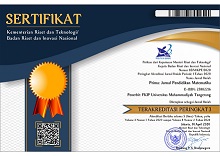ANALYSIS OF STUDENT’S MATHEMATICAL REASONING ABILITY IN SOLVING MATHEMATICAL PROBLEM BASED ON HOTS
Abstract
This study was focused onanalyzing student’s mathematical reasoning abilities in solving Higher Order Thinking Skill (HOTS) problems anddetermining the level of student understanding of HOTS questions. The researchmethod is qualitative descriptive with 12 subjects. Based on the results of the test, the subject’s reasoning abilities were grouped into 3 categories of reasoning abilities, namely high, moderate and low. The results showed that students who had high reasoning abilities were able to fulfill the 7 mathematical reasoning indicators very well at each stage of real analysis problem solving and were able to work on HOTS levelquestions to analyze and create. Students with moderate reasoning abilities were only able to fulfill several indicators of mathematical reasoning, namely presenting written statements, solving problems as planned and checking again. Students who had low reasoning abilities were not able to understand the questions well, so students cannot solve it. Based on the results of the questionnaire, it was concluded that 46.67% of students could understand the HOTS problem well, 33% of the students could not plan the solution, namely writingdown the information that was known in answering the questions, and 33% of the students were not able to check the validity of an argument and draw conclusions on the evidence. Furthermore, it was obtained the relationship between student’s mathematical reasoning abilities and the level of student understanding of HOTS-oriented questions which fulfilled the linear regression equation Y = 71.574 + 0.009X.This model showed that the level of student understanding of HOTS-oriented questions had a positive effect on learning outcomes. Based on the research results, it was suggested that lecturers provide more training related toproof with the aim of improving students' mathematical reasoning abilities.
Keywords
Full Text:
PDFReferences
Abadiyah, Agustiana Zakiyatuddarul.2016. Penalaran Matematika Dalam Argumentasi Kolektif Dalam Memecahkan Masalah Matematika Ditinjau dari Heterogenitas Kelompok Kemampuan Matematika.Tesis.Universitas Negeri Surabaya.
Abduh, Mochammad. 2019. Panduan Penulisan HOTS-Higher Order Thinking Skills. Jakarta. Pusat Penilaian Pendidikan.
Adamura, Fathriya, Susanti, Dewi Vera. Penalaran Matematis Mahasiswa Dengan Kemampuan Intuitif Sedang Dalam Memecahkan Masalah Analisis Riil. Jurnal Edukasi Matematika dan Sains. 6(2),201,77-92.Retrieved fromhttp://e-journal.unipma.ac.id/index.php/JEMS/article/view/5366
Adelia Alfama Zamista,dkk. 2019.Persepsi Mahasiswa Terhadap Pembelajaran Dalam jaringan Mata Kuliah Kalkulus.Jurnal THEOREMS (The Original Research of Mathematics) Vol.5 No.1 , Juli. hal. 41-48. Retrieved fromhttp://jurnal.unma.ac.id/index.php/th
Adijaya, Nuryansyah&Lestanto Pudji Santosa. 2018. Persepsi Mahasiswa Dalam Pembelajaran Online.Jurnal Wanastra Vol. 10 No. 2 September 2018 https://ejournal.bsi.ac.id/ejurnal/index.php/wanastra
Agfie Nurani Hanifah, Nurholipatus Sa’adah, Agung Dwi Sasongko.2018.Hubungan Kemampuan Penalaran matematis dan Motivasi Belajar Siswa SMK Melalui Model Pembelajaran Hypnoteaching.Jurnal Teorema-Teori dan Riset Matematika, 4(2), 121-130, September 2019 .https://jurnal.unigal.ac.id/index.php/teorema/article/view/2692
As’ari A.R, Ali, mohammad, dkk.Mengembangkan HOTS ( Higher Order Thinking Skills). Malang. Universitas Negeri Malang.
Dosinaeng, Duba Beda Wilfridus. 2019. Analisis Kemampuan Berpikir Tingkat Tinggi Mahasiswa Dalam Pemecahan Masalah Berorientasi Higher Order Thinking Skill (HOTS). Math Didactic : Jurnal Pendidikan Matematika. Vol 5 No.2, Mei-Agustus 2019.hal 133-147.https://doi.org/10.33654/math.v5i2.611
Lukmanul Hakima, Sukestiyarnob, Nur Karomah Dwidayantia,b. 2019. Analisis Kemampuan Penalaran Matematis pada Pembelajaran Problem Based Learning Berbantuan Modul Komik Etnomatematika.Seminar Nasional Pascasarjana 2019. ISSN 2686-6404
Muhammad Syarif Hidayatullah, Joko Sulianto, Mira Azizah. 2019.Analisis Kemampuan Penalaran Ditinjau dari Kemampuan Pemecahan Masalah Matematis.
Thinking Skills and Creativity Journal TSCJ, Vol2No 2, Tahun 2019 .https://ejournal.undiksha.ac.id/index.php/TSCJ/article/view/21198
NCTM.(2000). Principles and Standards for School Mathematics. USA: The National Council of Theachers ofMathematics,Inc.
Phuntsho,Ugyen, Dema Yeshi. 2019. Examining The Effect of Using Polya’s Problem Solving Model on Mthematical Academic Achievement and Analyzing Ability of the Fourth Grade Student’s.Asian Journal of Education and Social Studies.5(2),1-8.DOI: 10.9734/AJESS/2019/v5i230142
Shadiq, Fadjar. 2014. Pembelajaran Matematika : Cara Meningkatkan Kemampuan Berpikir Kritis Siswa. Yogyakarta : Graha Ilmu.
Sugiyono. 2013. Metode Penelitian Pendidikan: Pendekatan Kuantitatif, Kualitatif dan R&D. Bandung:Alfabeta.
Sumartini, T. S. 2015. Peningkatan Kemampuan Penalaran Matematis Melalui Pembelajaran Berbasis Masalah. Jurnal Pendidikan Matematika Vol.5, No.1.https://journal.institutpendidikan.ac.id/index.php/mosharafa/article/view/mv4n1_1
Suryadi.2012. Membangun Budaya Baru dalam Berpikir Matematika. Bandung: Rizqi.
DOI: http://dx.doi.org/10.31000/prima.v5i2.3661
Article Metrics
Abstract - 2592 PDF - 1762Refbacks
- There are currently no refbacks.
Prima: Jurnal Pendidikan Matematika
Program Studi Pendidikan Matematika
Fakultas Keguruan dan Ilmu Pendidikan
Universitas Muhammadiyah Tangerang
Jl. Perintis Kemerdekaan I/33, Cikokol
Kota Tangerang, Indonesia
e-mail: primajpm@gmail.com
Prima: Jurnal Pendidikan Matematika (p-ISSN: 2579-9827 | e-ISSN: 2580-2216) is licensed under a Creative Commons Attribution 4.0 International License.







